28.4k views
Managed DNS is a great way to save time and effort. If you don’t want to deal with managing your own DNS records, then managed DNS is a good solution. It also allows you to change your DNS settings at any time, which is not something you can do if you’re self-hosting.
Managed DNS is the process by which your organization’s network infrastructure uses DNS to route traffic between hosts and services on your internal network. This includes resolving host names into IP addresses and providing reverse lookup capabilities for IP address resolution.
This helps prevent problems like having multiple people accessing the same website at once or having different users in different locations attempting to access the same website simultaneously.
Managed DNS also provides a way to centralize information about your network so that everyone knows exactly what their role is within the network. You can easily add new devices to the network without manually updating each computer with the correct information.
You may choose to use a managed DNS provider for many reasons. Some of these include:

Managed DNS is a service that allows you to create and manage your domain name. It’s similar to how Google Apps manages Gmail and Facebook domains. With manage DNS, you can control who has access to your domain names and what they can do with them. If they decide to sell your domain name to another company, they could cause problems.
Managed DNS also lets you add custom DNS settings to specific websites. You can set different types of DNS records for certain sites. For example, you might want to allow visitors to your website to connect to your mail server but not let them access your FTP server.
There are many reasons why you should consider using a managed DNS service. Here are just a few:
If you already have a web hosting account from a reputable provider, you probably already have a domain name. You can easily purchase a new domain name through your host if you don’t. Once you’ve purchased the domain name, you can transfer it into your account at your host. Then, you point the domain name to your hosting account.
While there are several ways to control access to your website, including IP restrictions, password protection, and firewalls, you can also control access using DNS. With manage DNS, all users on your network will automatically have access to your site unless you specifically block them.
With managed DNS, you can store all your DNS records in one place. This makes it easier to update and maintain your DNS settings. Plus, if you ever lose your DNS settings, you can quickly restore them from this central database which makes it easier to update and maintain your records. In addition, since all of your DNS records are centralized, you won’t have to worry about accidentally deleting essential records.
When managing your DNS records, you’ll have to manually check every time to ensure that your records are updated. With managed DNS, this process is automated.
In conclusion, managed DNS is an excellent tool for any business owner looking to protect their online presence. You can ensure that your network remains secure, up-to-date, and accessible by giving you complete control over your domain names.
